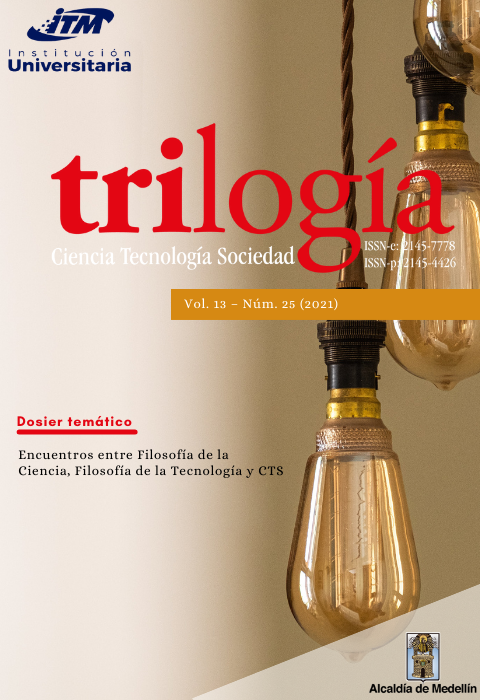Encuentros entre filosofía de la ciencia, filosofía de la tecnología y CTS
Resumen
Las relaciones entre la filosofía de la ciencia, la filosofía de la tecnología y el campo de la ciencia, la tecnología y la sociedad han sido amplias y diversas a lo largo de cinco décadas, prevaleciendo los distanciamientos, las controversias y las disputas. Sin embargo, el análisis desde la filosofía hacia los estudios CTS muestra que, tras la influencia de las guerras de la ciencia, entre estos campos ha surgido un nuevo escenario de encuentros novedosos y constructivos, especialmente en algunas perspectivas filosóficas específicas sobre ciencia y tecnología, las cuales, lamentablemente, aún son poco conocidas. Algunas de ellas incluyen estudios de la experimentación, el giro práctico planteado en la filosofía de la ciencia, el desarrollo de la epistemología histórica, el giro empírico en la filosofía de la tecnología y el planteamiento de la relevancia moral de los artefactos. El análisis de los encuentros entre estas perspectivas filosóficas y el campo CTS puede servir para estimular e invitar al desarrollo de otros posibles encuentros, como los que se presentan en este dosier temático.
Referencias bibliográficas
Achinstein, P.; Hannaway, O. (eds). (1985). Observation, Experiment and Hypothesis in Modern Physical Science. The MIT Press.
Achterhuis, H. (ed.). (2001). American Philosophy of Technology: The Empirical Turn. Indiana University Press.
Ashman, K. M.; Barringer, P. S. (eds.). (2001). After the Science Wars. Routledge.
Barberousse, A. (2018). Philosophy of Science and Science Studies. En A. Barberousse; D. Bonnay; M. Cozic (eds.), The Philosophy of Science: A Companion (pp. 259-284). Oxford University Press.
Batens, D.; van Bendegem, J. P. (eds). (1988). Theory and Experiment: Recent Insights and New Perspectives on Their Relation. Springer.
Becerra Batán, M. (2016). La cuestión de la Epistemología Histórica como estilo epistemológico. Epistemología e Historia de la Ciencia, v. 1, n. 1, 35-52. https://revistas.unc.edu.ar/index.php/afjor/article/view/14915
Bijker, W. E.; Hughes, T. P.; Pinch, T. (eds). (2012). The Social Construction of Technological Systems: New Directions in the Sociology and History of Technology. The MIT Press.
Braunstein, J. F. (2012). Historical Epistemology, Old and New. En Epistemology and History. From Bachelard and Canguilhem to Today’s History of Science (Preprint 434, pp. 33-40). https://www.mpiwg-berlin.mpg.de/Preprints/P434.PDF
Brandom, R. B. (1994). Making It Explicit: Reasoning, Representing, and Discursive Commitment. Harvard University Press.
Brandom, R. B. (2000). Articulating Reasons: An Introduction to Inferentialism. Harvard University Press.
Brey, P. (2010). Philosophy of Technology after the Empirical Turn. Techné: Research in Philosophy and Technology, v. 14, n. 1, 36-48. https://doi.org/10.5840/techne20101416
Callon, M. (1999). Whose Imposture? Physicists at War with the Third Person. Social Studies of Science, v. 29, n. 2, 261-286. https://doi.org/10.1177/030631299029002011
Daston, L. (2000). Biographies of Scientific Objects. University of Chicago Press.
Daston, L. (2009). Science Studies and the History of Science. Critical Inquiry, v. 35, n. 4, 798-813. https://doi.org/10.1086/599584
Daston, L.; Galison, P. (2007). Objectivity. Zone Books.
Esteban, J. M.; Martínez, S. F. (comps.). (2008). Normas y prácticas en la ciencia. Instituto de Investigaciones Filosóficas.
Feest, U.; Sturm, T. (2011). What (Good) is Historical Epistemology? Editors Introduction. Erkenntnis, v. 75, n. 3, 285-302. https://doi.org/10.1007/s10670-011-9345-4
Feenberg, A. (1999). Questioning Technology. Routledge.
Feltz, B. (1991). Croisées biologiques. Systémique et analytique. Écologie et biologie moléculaire en dialogue. Ciaco.
Ferreirós, J.; Ordóñez, J. (2002). Hacia una filosofía de la experimentación. Crítica. Revista Hispanoamericana de Filosofía, v. 34, n. 102, 47-86. https://doi.org/10.22201/iifs.18704905e.2002.979
Fleck, L. (1979). Genesis and Development of a Scientific Fact. The University of Chicago Press.
Galison, P. (1987). How Experiments End. University of Chicago Press.
Gooding, D.; Pinch, T.; Schaffer, S. (eds.). (1989). The Uses of Experiment. Studies in the Natural Sciences. Cambridge University Press.
Gross, P. R.; Levitt, N. (1994). Higher Superstition: The Academic Left and Its Quarrels with Science. The Johns Hopkins University Press.
Hacking, I. (1996). Representar e Intervenir. Paidós.
Hacking, I. (1988). Philosophers of experiment. PSA: Proceeding of the Biennial Meeting of the Philosophy of Science Association, v. 1988, n. 2, 147-156.
Hanson, N. R. (1958). Patterns of Discovery: An Inquiry into the Conceptual Foundations of Science. Cambridge University Press.
Ihde, D. (1990). Technology and the Lifeworld: From Garden to Earth. Indiana University Press.
Ihde, D. (2009) Postphenomenology and Technoscience: The Peking University Lectures. SUNY Press.
Knorr-Cetina, K. D. (1981). The Manufacture of Knowledge: An Essay on the Constructivist and Contextual Nature of Science. Pergamon.
Kreimer, P. (2017). An Unrequited Love. Social Sciences and STS. Revue d'anthropologie des connaissances, v. 11, n. 2. https://journals.openedition.org/rac/2254
Kroes, P.; Meijers, A. (eds.). (2000). The Empirical Turn in the Philosophy of Technology (Vol. 20). JAI Press.
Kuhn, T. S. (1962). The Structure of Scientific Revolutions. The University of Chicago Press.
Lakatos, I. (1971). The History of Science and its Rational Reconstructions. En R. C. Buck; R. S. Cohen (eds.), Boston Studies in the Philosophy of Science (Vol. 8, pp. 91-136). Springer. https://doi.org/10.1007/978-94-010-3142-4_7
Latour, B. (1987). Science in Action: How to Follow Scientists and Engineers through Society. Harvard University Press.
Latour, B.; Woolgar, S. (1979). Laboratory Life: The Social Construction of Scientific Facts. Sage Publications.
Law, J.; Williams, R. J. (1982). Putting Facts Together: A Study of Scientific Persuasion. Social Studies of Science, v. 12, n. 4, 535-557. https://doi.org/10.1177/030631282012004003
Lecourt, D. (1969). L’epistémologie historique de Gaston Bachelard. Libraire Philosophique J. Vrin.
Lemaine, G.; Darmon, G.; El Nemer, S. (1982). Noopolis. Les laboratoires de recherche fondamentale: de l'atelier à l'usine. CNRS.
Loeve, S.; Guchet, X.; Bensaude Vincent, B. (eds.). (2018). French Philosophy of Technology: Classical Readings and Contemporary Approaches (Vol. 29). Springer. https://doi.org/10.1007/978-3-319-89518-5
Lynch, M. (1985). Art and Artifact in Laboratory Science: A Study of Shop Work and Shop Talk in a Research Laboratory. Routledge & Kegan Paul.
Martínez, S. F.; Huang, X. (2015). Hacia una filosofía de la ciencia centrada en prácticas. Bonilla Artigas Editores.
Meijers, A. (ed.). (2009). Philosophy of Technology and Engineering Science. North Holland.
Mitcham, C. (1994). Thinking Through Technology: The Path between Engineering and Philosophy. The University of Chicago Press.
Moreno, J. C. (2018). Análisis de las contribuciones y de los sentidos de la epistemología histórica. Revista Colombiana de Filosofía de la Ciencia, v. 18, n. 37, 155-177. https://doi.org/10.18270/rcfc.v18i37.2573
Moreno, J. C. (2019). Contribuciones al debate sobre la relevancia moral de los artefactos tecnológicos. Trilogía Ciencia Tecnología Sociedad, v. 11, n. 21, 91-118. https://doi.org/10.22430/21457778.1327
Parsons, K. (ed.). (2003). The Science Wars: Debating Scientific Knowledge and Technology. Prometheus Books.
Pestre, D. (2004). Thirty Years of Science Studies: Knowledge, Society and the Political. History and Technology, v. 20, n. 4, 351-369. https://doi.org/10.1080/0734151042000304330
Pickering, A. (1984). Constructing Quarks: A Sociological History of Particle Physics. The University of Chicago Press.
Pitt, J. C. (ed.). (2010). New Directions in the Philosophy of Technology. Kluwer Academic Publishers.
Radder, H. (ed.). (2003). The Philosophy of Scientific Experimentation. University of Pittsburgh Press. https://doi.org/10.2307/j.ctt5hjsnf
Ravetz, J. R. (1971). Scientific Knowlegde and Its Social Problems. Clarendon Press.
Renn, J. (1995). Historical Epistemology and Interdisciplinarity. En K. Gavroglu; J. Stachel; M. W. Wartofsky (eds.). Physics, Philosophy, and the Scientific Community (pp. 241-251). Springer. https://doi.org/10.1007/978-94-017-2658-0
Renn, J. (1996). Historical Epistemology and the Advancement of Science. https://pure.mpg.de/rest/items/item_2273558/component/file_2273556/content
Renn, J. (2004). The Relativity Revolution from the Perspective of Historical Epistemology. Isis, v. 95, n. 4, 640-648. https://doi.org/10.1086/430654
Rheinberger, H. J. (1997). Toward a History of Epistemic Things. Synthesizing Proteins in the Test Tube. Stanford University Press.
Rheinberger, H. J. (2010). On Historicizing Epistemology: An Essay. Stanford University Press.
Rouse, J. (1993). What Are Cultural Studies of Scientific Knowledge? Configurations, v. 1, n. 1, 1-22. https://doi.org/10.1353/con.1993.0006
Rouse, J. (1996). Engaging Science: How to Understand Its Practices Philosophically. Cornell University Press.
Rouse, J. (1999). Understanding Scientific Practices: Cultural Studies of Science as a Philosophical Program. En M. Biagioli (ed.), The Science Studies Reader (pp. 442-456). Routledge.
Rouse, J. (2002). How Scientific Practices Matter: Reclaiming Philosophical Naturalism. University of Chicago Press.
Rouse, J. (2011). Philosophy of Science and Science Studies in the West: An Unrecognized Convergence. East Asian Science, Technology and Society: An International Journal, v. 5, n. 1, 11-26. https://doi.org/10.1215/s12280-010-9145-y
Shapin, S.; Schaffer, S. (1985). Leviathan and the Air-Pump: Hobbes, Boyle and the Experimental Life. Princeton University Press.
Shapin, S. (2000). La revolución científica: una interpretación alternativa. Ediciones Paidós.
Shinn, T. (1980). Division du savoir et spécificité organisationnelle : Les laboratoires de recherche industrielle en France. Revue française de sociologie, v. 21, n. 1, 3-35. https://doi.org/10.2307/3320898
Shinn, T. (1988). Hiérarchies des chercheurs et formes des recherches. Actes de la Recherche en Sciences Sociales, v. 74, 2-22.
Sismondo, S. (2010). An Introduction to Science and Technology Studies (2.a ed.). Wiley-Blackwell.
Sokal, A. D. (1996). Transgressing the Boundaries: Towards a Transformative Hermeneutics of Quantum Gravity. Social Text, v. 14, n. 46/47, 217-252. https://doi.org/10.2307/466856
Soler, L.; Zwart, S.; Lynch, M.; Israel-Jost, V. (eds). (2014). Science after the Practice Turn in the Philosophy, History, and Social Studies of Science. Routledge.
Sturm, T. (2011). Historical Epistemology or History of Epistemology? The Case of the Relation Between Perception and Judgment. Erkenntnis, v. 75, n. 3, 303-324. https://doi.org/10.1007/s10670-011-9338-3
Thill, G. (1973). La fête scientifique: D'une praxéologie scientifique à une analyse de la décision chrétienne. Aubier Montaigne.
Tiles, M. (1984). Bachelard: Science and Objectivity. Cambridge University Press.
Tiles, M. (1989). Epistemological History: The Legacy of Bachelard and Canguilhem. En A. Phillips Griffiths (ed.), Contemporary French Philosophy (pp. 141-156). Cambridge University Press. https://doi.org/10.1017/CBO9780511628733.011
Traweek, S. (1988). Beamtimes and Lifetimes: The World of High Energy Physicists. Harvard University Press.
Verbeek, P. P. (2005). What Things Do: Philosophical Reflections on Technology, Agency, and Design. Pennsylvania State University Press.
Verbeek, P. P. (2011). Moralizing Technology: Understanding and Designing the Morality of Things. The University of Chicago Press.
Vinck, D. (1992). Politique de la science et de la technologie. Du laboratoire aux réseaux: Le travail scientifique en mutation. http://aei.pitt.edu/id/eprint/56991
Vinck, D. (2007). Back to the laboratory as a knowledge production space. Revue d'anthropologie des connaissances, v. 1, n. 2, 1-7. https://doi.org/10.3917/rac.002.0159
Vinck, D. (2019). Le chaos producteur de sens et de surgissements du monde. En F. Warrant (dir.), Une pensée de l'écart et de la fête: Hommage à Georges Thill (pp. 107-114). Presses Universitaires de Namur.
Zammito, J. H. (2004). A Nice Derangement of Epistemes: Post-Positivism in the Study of Science from Quine to Latour. The University of Chicago Press.
Descargas
Derechos de autor 2021 Instituto Tecnológico Metropolitano

Esta obra está bajo una licencia internacional Creative Commons Atribución-NoComercial-CompartirIgual 4.0.

| Estadísticas de artículo | |
|---|---|
| Vistas de resúmenes | |
| Vistas de PDF | |
| Descargas de PDF | |
| Vistas de HTML | |
| Otras vistas | |







